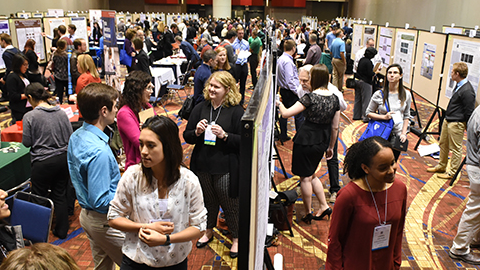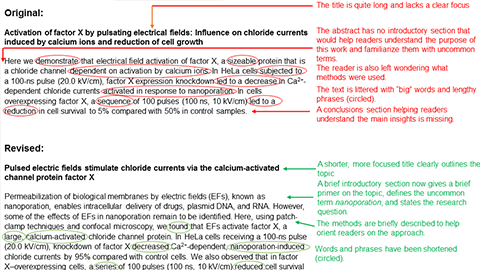Abstracts
Last chance abstracts
Last chance abstracts will not be eligible for oral talks. Each last chance abstract submission carries a $100 nonrefundable processing fee. The abstract submission fee is not the registration fee or society membership fee.
Poster presenters will be able to upload a PDF of their poster and make a voice recording of their presentation. Meeting attendees will browse the poster gallery, listen to presentations and post questions in a Q&A box for presenters to answer.
See the Experimental Biology guidelines for full details about submitting an abstract.
Abstract topic categories
During the abstract submission process, you will need to select one topic that most closely represents the submitted research. To be programmed in an ASBMB session, select one of the topics with a 2000-series number listed below:
| 2000 | DNA Recombination, Structure and Topology |
|---|---|
| 2001 | DNA Polymerases, Telomerase, Replicases and Replisomes |
| 2010 | Chromatin Structure, Remodeling and Gene Expression |
| 2011 | Epigenetic Modifications of DNA and RNA |
| 2012 | Transcriptional Mechanisms, Regulation and RNA Polymerases |
| 2020 | RNA: Processing, Transport, and Regulatory Mechanisms |
| 2021 | RNA Binding Proteins |
| 2022 | Non-coding RNAs |
| 2023 | RNA Processing and Editing |
| 2030 | Protein Synthesis, Structure, Modifications and Interactions |
| 2031 | Mechanisms and Regulation of Protein Synthesis and Dynamics |
| 2032 | Protein Interactions and Binding |
| 2033 | Protein Modifications |
| 2034 | Protein Structure and Biophysics |
| 2035 | Protein Folding and Chaperones |
| 2036 | Protein Turnover, Misfolding, Aggregation and Degradation |
| 2037 | Intrinsically Disordered Proteins, Prions and Amyloids |
| 2038 | Proteasomes: Structure and Regulation |
| 2050 | Enzyme Chemistry and Catalysis |
| 2051 | Enzyme Mechanisms, Kinetics and Energetics |
| 2052 | Structural Dynamics of Enzymes and Multienzyme Complexes |
| 2053 | Enzyme Regulation and Allosterism |
| 2060 | Chemical Biology, Drug Discovery and Bioanalytical Methods |
| 2061 | Drug Screening and Development |
| 2062 | Chemical Biology of Natural Products, Nucleic Acids and Small Molecules |
| 2063 | Chemical Probes, Biosensors and Biomarkers |
| 2064 | Protein Engineering and Design |
| 2065 | Protein-Small Molecule Interactions |
| 2066 | Nanotechnology |
| 2070 | Genomics, Glycomics, Proteomics and Metabolomics |
| 2071 | Genomics |
| 2072 | Glycomics |
| 2073 | Protemomics |
| 2074 | Metabolomics |
| 2075 | Computational Biology and Bioinformatics |
| 2080 | Signal Transduction and Cellular Regulation |
| 2081 | Extracellular Matrix and Cell Signaling |
| 2082 | G proteins and Small GTPases |
| 2083 | Protein Kinases and Phosphatases |
| 2084 | Apoptosis and Cell Death |
| 2085 | Tumor Suppressors and Tumor Drivers |
| 2086 | Cancer Signaling and Therapeutics |
| 2087 | Neurobiology and Neuronal Signaling |
| 2088 | Immune Signaling |
| 2090 | Bacteria and Parasites: From Microbiome to Antibiotics |
| 2091 | Microbe/Parasite-Host Interactions |
| 2092 | Antibiotic Resistance |
| 2093 | Antibacterial Targets and Drug Discovery |
| 2094 | Microbiomes |
| 2100 | Metabolism and Bioenergetics |
| 2101 | Oxidative Stress and Reactive Oxygen |
| 2102 | Metabolism and Cancer |
| 2103 | Metabolism and Nutrition |
| 2104 | Diabetes, Obesity and Metabolic Syndrome |
| 2110 | Lipids and Membranes |
| 2111 | Regulation of Lipid Metabolism |
| 2112 | Lipids and Inflammation |
| 2113 | Membrane Proteins and Lipid Interactions Membrane Proteins, Lipid Interactions, and Lipid Domains |
| 2114 | Vesicle Trafficking and Cargo |
| 2120 | Glycans and Glycobiology |
| 2121 | Glycosyltransferases and Hydrolases |
| 2122 | Glycan binding proteins |
| 2123 | Glycans in Disease |
| 2170 | BMB Education and Professional Development |
| 2171 | Active Learning in the Molecular Life Sciences |
| 2172 | Big data in Molecular Life Sciences, student projects, labs and the classroom |
| 2173 | Institutional change and faculty perspectives about teaching in the life sciences |
| 2174 | Service learning initiatives, community involvement and context dependent Biochemistry instruction |
| 2180 | Interdisciplinary/Translational Science (SEBM) |
Resources
Meeting abstract advice
We’ve rounded up some tips on what to do (and not do) to make your abstract shine.
Tips and tricks for writing great conference abstracts
You only have a few hundred words. Martin Spiering tells you how to make every one count.


